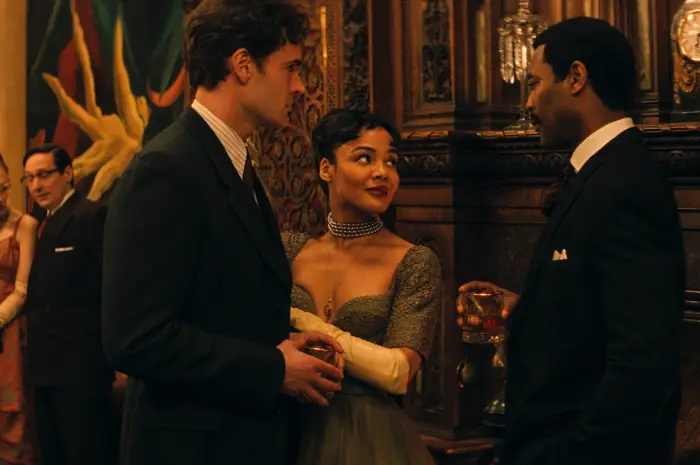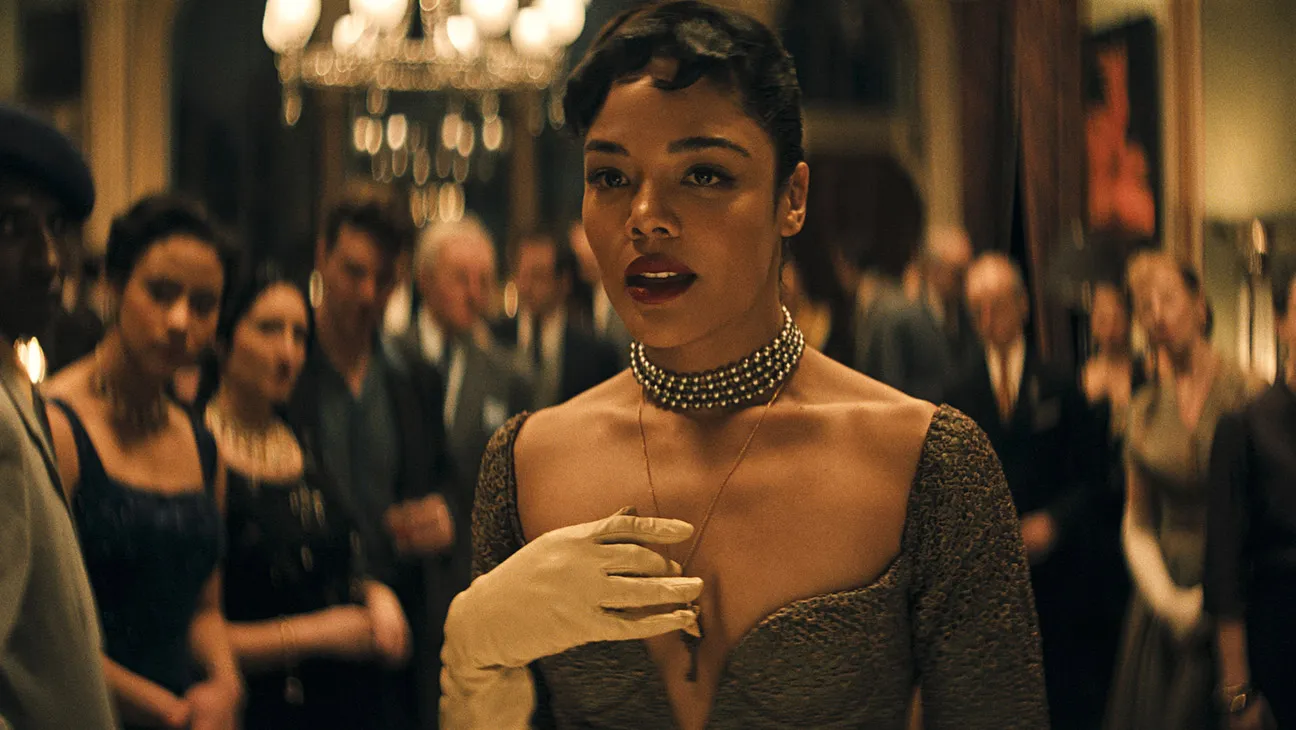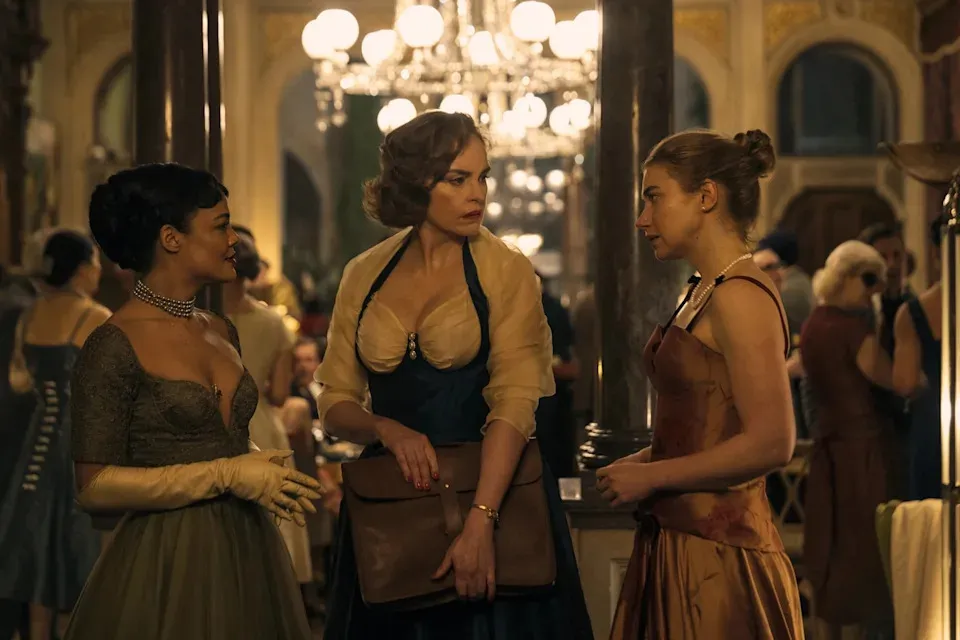

Tessa Thompson Brings Star Power to Nia DaCosta’s Playful Spin on the Ibsen Classic
Tessa Thompson returns to the big screen with remarkable energy in Nia DaCosta’s Hedda, a fresh, stylish reimagining of Henrik Ibsen’s timeless play Hedda Gabler. With a stellar supporting cast including Nina Hoss, Imogen Poots, and Tom Bateman, this adaptation transports the 19th-century drama into a lively mid-20th-century English setting, offering a bold, provocative exploration of power, desire, and control.
DaCosta, known for her distinctive work in films like Little Woods and Candyman, delivers her fourth feature with a playful and vibrant touch. The result is a film that blends classic theater with modern cinematic style, reminding audiences why Hedda Gabler remains one of literature’s most fascinating anti-heroines.
The Story of Hedda: A Restless Woman in a Gilded Cage
At the center of the film is Hedda Gabler (Tessa Thompson), the daughter of a powerful general who left her his beloved gun collection. Hedda wears the key to the locked case around her neck, symbolizing both her control and her inner turmoil.
Now married to George Tesman (Tom Bateman), an ambitious but dull academic, Hedda struggles to adjust to domestic life. George adores her, yet she remains unsatisfied. Judge Brack (Nicholas Pinnock), a family friend, looms in the background, watching Hedda closely while exploiting her vulnerability.
The grand English mansion becomes a stage for Hedda’s manipulations. With a mischievous grin and insatiable boredom, she toys with those around her. When her former lover, now reimagined as Eileen Lovborg (Nina Hoss), arrives with her new partner Thea (Imogen Poots), Hedda seizes the opportunity to stir chaos. Her interference tests their relationship, threatens George’s academic prospects, and spirals into dangerous consequences.
Nia DaCosta’s Fresh Vision for Hedda
Nia DaCosta injects new life into Ibsen’s classic by moving the story from the 19th century into the 1950s, a time of postwar social transformation. The lavish setting of an English mansion, with its sprawling grounds and bustling staff, provides both elegance and irony. Beneath the polished surface lies a simmering rebellion against tradition, propriety, and patriarchy.
Known for her sharp ability to balance tone, DaCosta brings a playful, sexy, and daring energy to the story. The film unfolds during a single, extravagant party, heightening the drama and chaos. This narrative choice creates a theatrical yet cinematic feel, blending witty dialogue with sweeping visuals.
The shift in characterization also stands out. Instead of repeating Ibsen’s original framework, DaCosta uses adaptation as reinvention. The result is not just a retelling but a reinterpretation that feels relevant for modern audiences.
Tessa Thompson’s Star Power as Hedda
Tessa Thompson shines as Hedda, a character who demands both charisma and complexity. Thompson plays her as a woman who masks dissatisfaction with charm and wields etiquette as a weapon.
Her performance is layered:
-
Confidence and elegance in her social interactions.
-
Dark undertones of manipulation and control.
-
Playfulness that masks deep despair.
It’s one of Thompson’s most dynamic roles in years. Audiences see her wield both physical and emotional power, from her control over her father’s guns to her ability to unravel the lives of those around her. Hedda is not simply a victim of circumstance—she is both the disruptor and the disrupted.
Nina Hoss and Imogen Poots Steal Scenes
While Thompson anchors the film, the supporting cast elevates it.
-
Nina Hoss as Eileen Lovborg delivers a captivating performance. Charismatic, intelligent, and alluring, she embodies the tension between Hedda’s past desires and present insecurities. Hoss portrays Eileen with warmth and wit, making her relationship with Thea both believable and compelling.
-
Imogen Poots as Thea surprises with a restrained yet powerful presence. Traditionally portrayed as meek in Ibsen’s play, Thea here becomes a quietly strong figure. Her kindness and patience contrast Hedda’s chaos, making her a formidable rival without needing aggression.
Together, the trio forms the heart of the story—three women navigating identity, desire, and societal expectations in ways the men around them fail to comprehend.
Tom Bateman and Nicholas Pinnock Represent Old Power
The male characters, though secondary, add depth to the conflict.
-
Tom Bateman as George Tesman embodies the earnest but unexciting husband. His desperation to succeed academically mirrors his desperation to keep Hedda’s love. Yet his devotion only underscores Hedda’s boredom.
-
Nicholas Pinnock as Judge Brack brings quiet menace to the role. Always present, always watching, Brack symbolizes the external pressures of a patriarchal society. His presence amplifies Hedda’s feeling of entrapment, pushing her toward reckless decisions.
Themes of Power, Desire, and Control
At its core, Hedda explores universal themes that resonate beyond time and place:
-
Power: Hedda’s attempts to control others highlight her lack of control over her own life.
-
Desire: Her conflicted attraction to Eileen and her jealousy of Thea reveal the complexity of human longing.
-
Control vs. Chaos: The more Hedda manipulates, the less she maintains true power, until everything unravels.
DaCosta’s adaptation doesn’t shy away from these themes. Instead, it emphasizes them through vibrant performances and bold storytelling choices.
Visuals and Atmosphere
The cinematography captures both the elegance and absurdity of Hedda’s world. The stately mansion serves as both a prison and a playground. Sweeping shots of lush grounds contrast with intimate close-ups that reveal the characters’ inner struggles.
The party setting becomes a microcosm of society, where appearances matter more than truth. Beneath the glamour, characters engage in dangerous games of influence and deception.
From Ibsen’s Classic to DaCosta’s Interpretation
Henrik Ibsen’s Hedda Gabler is a story of a woman confined by societal norms, wielding intellect and manipulation as her only weapons. Traditionally, the play ends with Hedda’s suicide—a final act of control in a life where she had none.
DaCosta’s adaptation respects the essence of the original but reshapes it with:
-
A mid-20th century setting.
-
Gender shifts in key roles.
-
A more dynamic focus on female relationships.
By making Lovborg female and centering the rivalry with Thea, DaCosta reframes the story as one about women reclaiming narratives traditionally defined by men.
Why Hedda Resonates Today
Despite its period setting, Hedda speaks directly to contemporary audiences. Its themes of dissatisfaction, societal pressure, and the search for identity remain timeless.
In an era where viewers crave both complex female characters and bold reinterpretations of classics, Hedda arrives as a refreshing and necessary addition.
Final Verdict: A Bold and Entertaining Reimagining
Nia DaCosta’s Hedda is a film that balances elegance with mischief, wit with darkness. Anchored by Tessa Thompson’s magnetic performance, it reintroduces audiences to one of literature’s most compelling anti-heroines in a new light.
With strong support from Nina Hoss and Imogen Poots, the film becomes more than an adaptation—it’s a celebration of female power, complexity, and creativity.
DaCosta proves once again that she is a filmmaker unafraid to take risks. By blending classic drama with playful reinvention, she reminds audiences of the enduring power of storytelling.
For fans of Ibsen, Thompson, or simply daring cinema, Hedda is a must-watch.a




















